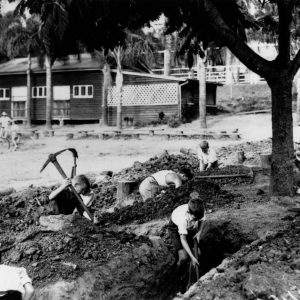
Unearthing Whispers of the Past: A Guide to Preserving and Exploring Southern History Through Local Archives and Collections
The American South, a region steeped in both captivating beauty and complex legacies, holds within its soil and stories a past that continues to shape the present. Preserving this history, in all its multifaceted glory, is paramount to understanding ourselves and forging a more informed future. But where do we begin to delve into the whispers of yesteryear? The answer lies not in grand national museums, but in the intimate embrace of local archives and collections.
These repositories, often tucked away in unassuming buildings – libraries, historical societies, even private homes – are the guardians of irreplaceable treasures: faded photographs, handwritten letters, tattered maps, and whispered oral histories. They offer a far richer, more nuanced perspective than textbooks ever could, allowing us to connect with the real lives, struggles, and triumphs of those who came before us.
This guide serves as a compass, pointing you towards the hidden corners of Southern history and offering practical advice on how to not only explore but also contribute to the preservation of these invaluable resources.
Why Local Archives Matter: Beyond the Textbook Narrative
Imagine holding in your hands a letter penned by a Confederate soldier to his sweetheart, the ink smudged with tears and worry. Or tracing the lines of a plat map from the 18th century, revealing the names of early settlers and the layout of a burgeoning town. These tangible links to the past offer a visceral connection that transcends the sterile pages of a history book.
Local archives offer:
- Deeper Context: They illuminate the lives of ordinary people, providing a counterpoint to the narratives often dominated by prominent figures.
- Unfiltered Voices: They preserve primary sources – documents created during the period being studied – allowing you to form your own interpretations.
- Personal Connection: They foster a sense of belonging and understanding of your community’s unique story.
- Preserving Our Collective Memory: They safeguard cultural heritage for future generations.
Navigating the Labyrinth: Finding and Utilizing Local Archives
Discovering these historical havens requires a bit of detective work, but the rewards are well worth the effort. Here’s a guide to get you started:
- Local Libraries: Start here! Public libraries often have dedicated local history sections, sometimes with trained archivists on staff.
- Historical Societies: These organizations are passionate about preserving local heritage and frequently maintain extensive collections. Search for “[Your County/City] Historical Society” online.
- Genealogical Societies: If you’re interested in family history, these societies can provide valuable resources and connections to local records.
- University Special Collections: Many universities in the South have special collections departments dedicated to preserving regional history, folklore, and culture.
- Courthouse Records: Deeds, wills, and other legal documents offer a wealth of information about land ownership, family relationships, and economic activity. (Access often varies by county).
- Museums (Small & Local): Don’t overlook smaller, community-based museums. They often house unique collections specific to their region.
- Online Directories: Websites like the Society of American Archivists (SAA) offer directories of archives, though coverage may vary.
Essential Tips for Archive Explorers:
- Contact Before Visiting: Always call or email ahead to confirm hours, accessibility, and any specific policies regarding research.
- Understand Restrictions: Some materials may be fragile or restricted due to privacy concerns. Respect the rules set by the archive.
- Handle Materials with Care: Wear gloves (often provided) when handling delicate documents. Avoid eating or drinking near archival materials.
- Take Notes Diligently: Bring a notebook and pencil (pens are often prohibited). Consider bringing a digital camera or smartphone to take photographs (with permission).
- Be Patient and Persistent: Research can be time-consuming. Don’t be discouraged if you don’t find what you’re looking for immediately.
- Cite Your Sources: Properly credit the archive and specific materials you use in your research.
- Ask for Help! Archivists are invaluable resources. They can help you navigate the collection and provide guidance for your research.
Table 1: Types of Materials Commonly Found in Southern Local Archives
| Material Type | Examples | Information Provided |
|---|---|---|
| Documents | Letters, Diaries, Deeds, Wills, Court Records, Church Records | Personal experiences, property ownership, legal disputes, family relationships, religious practices |
| Visuals | Photographs, Maps, Postcards, Architectural Drawings, Paintings | Visual representations of people, places, and events, land use, architectural styles |
| Oral Histories | Audio and Video Recordings of Interviews with Local Residents | First-hand accounts of historical events, cultural traditions, personal perspectives |
| Printed Materials | Newspapers, Pamphlets, Broadsides, Local Histories, Organizational Records | News events, political opinions, social movements, community activities, organizational structures |
| Artifacts | Tools, Clothing, Furniture, Household Items | Material culture, daily life, economic activities |
Preserving the Past: How You Can Contribute
Preserving Southern history is not just the responsibility of archivists and historians; it’s a collective endeavor. Here’s how you can play a vital role:
- Donate Family Papers and Photographs: Don’t let valuable historical materials languish in attics and basements. Consider donating them to a local archive where they can be properly preserved and made accessible to researchers.
- Conduct Oral History Interviews: Talk to your elders and record their memories. These first-hand accounts are invaluable and often disappear with time.
- Volunteer at Local Archives: Archives often rely on volunteers to help with tasks such as cataloging, digitization, and transcription.
- Support Local Historical Societies: Join a historical society and contribute to their fundraising efforts.
- Digitize Important Documents: Help preserve fragile documents by digitizing them and making them available online.
- Educate Others: Share your knowledge of local history with friends, family, and community members.
- Advocate for Funding: Support local archives by advocating for increased funding from government and private sources.
Table 2: Simple Ways to Contribute to Local Archives
| Action | Impact | Time Commitment |
|---|---|---|
| Donate Old Photos | Preserves visual history; makes images accessible to researchers | Varies |
| Volunteer Time | Helps archivists with tasks; supports archive operations | Flexible |
| Conduct Interviews | Captures valuable oral histories before they’re lost | Varies |
| Share on Social Media | Raises awareness of local history; engages the community | Minimal |
Beyond the Archives: Bringing History to Life
Exploring local archives is just the beginning. Here are some creative ways to bring Southern history to life in your community:
- Walking Tours: Lead guided walking tours of historic neighborhoods, highlighting significant buildings and events.
- Living History Demonstrations: Organize living history demonstrations that recreate aspects of daily life from a particular period.
- Community Theater Productions: Stage plays based on local historical events or figures.
- Documentary Films: Create documentary films that tell the stories of your community’s past.
- Educational Programs for Children: Develop educational programs that teach children about local history in an engaging and interactive way.
Conclusion: A Legacy Worth Preserving
The South’s history is a tapestry woven with threads of resilience, innovation, tragedy, and hope. By actively engaging with local archives and collections, we can unravel the complexities of this past, understand the present, and build a more informed and equitable future. Let us embrace the challenge of preserving these invaluable resources and ensuring that the whispers of the past continue to resonate for generations to come. The story of the South, in all its intricate beauty and undeniable complexity, is a story worth telling, a story worth preserving, and a story that belongs to us all.

Additional Information
Preserving Southern History: A Guide to Local Archives and Collections – A Deeper Dive
“Preserving Southern History: A Guide to Local Archives and Collections” serves as an essential primer for researchers, historians, genealogists, and community members seeking to engage with the region’s complex and multifaceted past. While the guide itself offers a roadmap to accessing primary source materials, this expanded analysis delves deeper into the challenges, opportunities, and ethical considerations inherent in preserving and interpreting Southern history through its local repositories.
The Importance of Local Archives: More Than Just Documents
Local archives represent a vital counterpoint to the grand narratives often dominating historical discourse. National archives and prominent university collections, while valuable, can inadvertently privilege perspectives from centers of power. Local archives, however, often house the records of ordinary people, marginalized communities, businesses, and organizations that shaped the lived realities of the South. These collections offer granular detail, nuanced perspectives, and a more intimate understanding of historical events.
Examples and Case Studies:
- The Amistad Research Center at Tulane University: While physically located within a prominent institution, the Amistad’s dedication to preserving the history of African Americans and ethnic minorities in the US, including a significant focus on the South, demonstrates the power of specialized local collections. Its holdings challenge dominant narratives and offer researchers invaluable insights into the experiences of historically underrepresented communities.
- County Courthouses: These repositories, often overlooked, hold a wealth of information regarding land ownership, legal disputes, probate records, and even early census data, vital for genealogical research and understanding local economic and social structures. The challenge here lies in accessibility, as digitization efforts often lag behind larger institutions.
- Church Archives: Southern churches, particularly those with long histories, are often repositories of birth, marriage, and death records, membership lists, and even minutes of meetings that reveal social dynamics and community values. For example, the archives of historic Black churches throughout the South frequently hold vital information about the Civil Rights Movement and the ongoing struggle for racial justice.
Challenges in Preservation and Access:
Preserving Southern history within local archives faces numerous challenges:
- Funding Constraints: Small institutions and volunteer-run historical societies often struggle to secure funding for archival materials, digitization projects, and climate-controlled storage facilities. This can lead to deterioration of documents and limited public access.
- Limited Staffing: Many local archives rely on volunteers, often lacking formal archival training, to manage collections. This can impact the organization, preservation, and accessibility of materials.
- Digitization Backlog: The sheer volume of historical records in the South necessitates large-scale digitization efforts. However, the cost and labor involved in digitizing, cataloging, and making these materials available online remains a significant barrier. Statistics: Studies indicate that only a small fraction of historical records in the South have been fully digitized and made accessible online.
- Uneven Documentation: Historical records are rarely comprehensive. Certain voices and perspectives may be underrepresented or missing altogether, due to systemic biases in record-keeping practices. This requires careful consideration and a critical approach when interpreting archival materials.
Ethical Considerations and Interpretation:
Engaging with Southern history requires a mindful approach to issues of race, slavery, the Confederacy, and their lasting legacies. Local archives often contain materials that are inherently problematic or offensive.
- Contextualization is Key: Archivists and researchers must provide adequate context for sensitive materials, explaining their historical origins and potential biases. Ignoring or glossing over uncomfortable aspects of the past hinders true understanding and reconciliation.
- Representation and Inclusivity: Efforts should be made to actively seek out and preserve the histories of marginalized communities, ensuring that diverse voices are represented in archival collections. This may involve community outreach, oral history projects, and partnerships with local organizations.
- Acknowledging Conflicting Narratives: Southern history is often characterized by conflicting interpretations and perspectives. Archival research should acknowledge and address these discrepancies, promoting a more nuanced and inclusive understanding of the past.
- Reparative Archiving: This emerging field recognizes the ways in which traditional archival practices have perpetuated systemic inequalities. Reparative archiving seeks to address these imbalances by prioritizing the preservation of materials related to marginalized communities, advocating for community control over their own histories, and actively challenging dominant narratives.
Opportunities and Future Directions:
Despite the challenges, there are significant opportunities for strengthening and expanding access to Southern history through local archives:
- Community Engagement: Collaborative partnerships between local archives, community organizations, and educational institutions can foster greater awareness of and engagement with local history.
- Digital Humanities Initiatives: Leveraging digital tools and platforms can enhance access to archival materials, facilitate research collaboration, and create innovative ways to interpret and present Southern history.
- Crowdsourcing and Citizen Archivists: Engaging the public in digitization and transcription projects can significantly accelerate the process of making historical records available online.
- Policy Advocacy: Supporting policies that promote funding for archival preservation and access is crucial for ensuring the long-term sustainability of local archives.
- Education and Training: Providing archival training opportunities for volunteers and community members can improve the management and accessibility of local collections.
Conclusion:
Preserving Southern history through local archives and collections is not merely about safeguarding documents; it is about fostering a more inclusive, nuanced, and honest understanding of the region’s complex past. By addressing the challenges, embracing ethical considerations, and seizing the opportunities outlined above, we can ensure that future generations have access to the primary source materials necessary to engage with, learn from, and shape their understanding of Southern history. The guide, “Preserving Southern History: A Guide to Local Archives and Collections,” provides a starting point, but the real work lies in ongoing engagement, critical analysis, and a commitment to representing the diverse experiences that have shaped the South.






